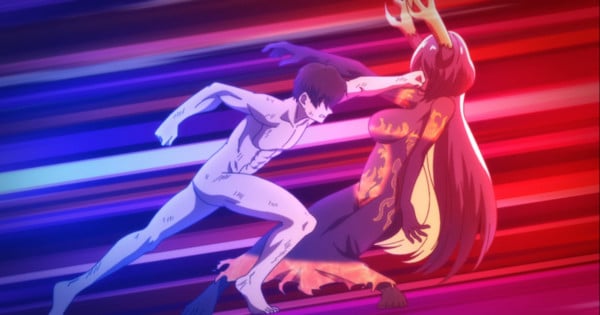Curated From www.animenewsnetwork.com Check Them Out For More Content.

©2023 Aoi Akashiro, Hangetubansonsyo/HERO’S/KAMIKATSU Project
I struggled for a while on how to cover this finale. I could have gone the easy route and broken down the plot, but there isn’t anything here that I haven’t talked about before. The story arc resolves exactly as you’d expect, finishing up the battle with Gaia in a way nearly identical to Daikini’s arc. The same characters make the same jokes in the same way they have for months. There’s no full conclusion, just a promise that the story will continue, so please go read the manga. If I went at it that way, I’d risk being as repetitive as I accuse the show of being.
Maybe, I thought, I could delve into the failing animation. Yet that is also largely the same as it has been for a while – poorly edited, unpolished, and clearly masking a melting production schedule that was obvious even before the show’s two delays. This finale looks bad, for sure, but not notably worse compared to previous episodes. Nothing here compares to the missing instruments from episode 10, and even the pixel art is confined to the final ED sequence. So again, I’d just be stating the self-evident if I focused on that.
Finally, I decided we should give it one last go on the show’s defining element. I may have given up on the series having anything halfway cogent to say about religion, but with this last episode, I think it’s only fair to comb through KamiKatsu as a singular text and suss out what it does or doesn’t have on its mind. Sure, I risk giving that element more thought than the creators, but at this point, it’s the best angle I can think of to send this show off with some amount of good faith.
So then, what can we say for certain about KamiKatsu‘s perspective on religion? It seems to have some grasp on, for lack of a better word, the “political” aspect at least, which is the act of amassing social power through shared belief and community. It understands that giving people ways to improve their lives – be it through technology, camaraderie, or general support for better living – is a good way to gain loyalty. That’s certainly true – as I mentioned back in the very first episode review, Jim Jones and the Peoples Temple routinely used their political power to help other members financially and would use their followers to sway political movements like racial segregation. That foundation, combined with Jones’ manipulative charisma, eventually led to one of the darkest events in modern history, proving just how powerful it could be. So there’s at least an accurate observation, although it’s only the tip of a much larger topic with very serious implications. In all, it’s a pretty surface-level observation, though not an inaccurate one, but it isn’t a coherent statement in and of itself.
Then we have the sex angle with Daikini, which is a very interesting idea in the abstract. Many people like sex, and real-life cults have used this exact tactic to gain members, be it through preaching sexual liberation, or even direct attempts at enticing people to join through the promise of sex. The Children of God, now called The Family International, have a long-documented tactic called “Flirty Fishing” where they send out young, attractive members to manipulate outsiders into attending meetings by insinuating they’ll have sex with them. That’s a controversial (and frankly creepy) thing that KamiKatsu could have a field day with, but it never really treats the topic of sex as anything but a joke. Daikini may have wound up joining the good guys, but her penchant for sex is treated the same as every other instance of sexy – as a crass punchline and nothing more. If anything, the way the story conflates kink with actually harmful stuff like Roy’s pedophilia and attempted rape suggests a pretty negative view of sex. At best, it thinks anything involving sex is inherently funny and a way to make money.
So how about Gaia’s “family” cult? That’s an incredibly dark and potent form of cultism, well outside the wheelhouse of this show, so I can’t be too angry that it didn’t approach the topic with much depth. If you, really, really want to have a bad time, you can google The Ant Hill Kids to learn about just how horrific this kind of boutique, a familial cult can become. It makes it all the more uncomfortable how easily she’s absolved of all the kidnapping and child manipulation before being welcomed back into the fold as yet another “comedic” rapist shtick. So frankly that whole angle is a bust since even Gaia’s backstory was rendered a joke thanks to last week’s musical decisions.
What are we left to glean from these ideas and their presentation? I can tell you that the show has a pretty cynical view of religion, but not in a way that feels particularly motivated or even angry. It sees it as grounds for irreverent jokes and a convenient plot device for its supernatural battle storyline. It’s telling how quickly religious followers turned into Mana Points and became a matter of balancing numbers more than anything. Even this finale has Atar sideload all her followers into Mitama to win this latest fight. In real life, doing something like that involved Jim Jones pretending that the spirit of a dead reverend named Father Divine had been reborn in his body, and it didn’t even work! But here, it’s as convenient as Church Venmo, because, ultimately, the whole cult angle was only ever a cheaply worn gimmick for the plot mechanics.
That’s to say nothing of the more personal, individual aspect of religion. The closest we get to explore that is Yukito promising to become Mitama’s follower if she saves him – something that could potentially play on the idea of someone turning to religion in their darkest hour, were it not a predictable fakeout. Yukito was, of course, merely lying to get Mitama to help him, because he would never actually be willing to trust Mitama, and it’s laughable to think he ever would. That says it all, honestly, because just like its protagonist, KamiKatsu could never be sincere enough to delve into the reasons why somebody may or may not believe in the divine or supernatural. That’s something that requires honest vulnerability and sympathy to understand, and this show’s brand of humor is fundamentally opposed to that.
I don’t mean to imply that faith is an inherently good thing, but merely that it is a complicated and nuanced topic – and I say that as someone who isn’t religious at all. Yet, I have seen people who are – or were – mine it for striking, memorable, and painfully funny art. I’ve seen stories affirming, denying, or reinterpreting religion that not only had a statement they wanted to make, but also did so in artistically adventurous ways. In the right hands, with a coherent perspective on the topics at play, you could have an amazing show with these ideas.
KamiKatsu isn’t that, nor could it ever really be. The most thought-provoking thing it ever did was make people wonder if it was put together wrong on purpose, and even that argument lost wind well before the show ended. So, all we’re left with is a cynical, caustic, misbegotten mess of an anime. May it rest in the afterlife, never to trouble the living again.
Rating:
KamiKatsu: Working for God in a Godless World is currently streaming on
Crunchyroll.

